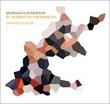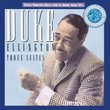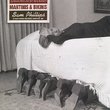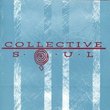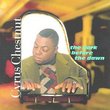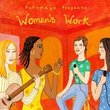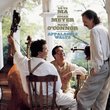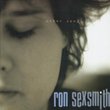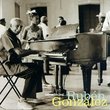| All Artists: Frank Zappa, Jean-Luc Ponty Title: King Kong: Jean Luc Ponty Plays The Music Of Frank Zappa Members Wishing: 6 Total Copies: 0 Label: Blue Note Records Original Release Date: 1/1/1969 Re-Release Date: 7/13/1993 Genres: Jazz, Pop, Rock Styles: Jazz Fusion, Modern Postbebop, Smooth Jazz, Bebop, Progressive, Progressive Rock Number of Discs: 1 SwapaCD Credits: 1 UPCs: 077778953920, 077778953951 |
Search - Frank Zappa, Jean-Luc Ponty :: King Kong: Jean Luc Ponty Plays The Music Of Frank Zappa
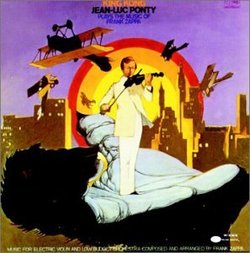 | Frank Zappa, Jean-Luc Ponty King Kong: Jean Luc Ponty Plays The Music Of Frank Zappa Genres: Jazz, Pop, Rock
King Kong: Jean-Luc Ponty Plays the Music of Frank Zappa was an active collaboration; Frank Zappa arranged all of the selections, played guitar on one, and contributed a new, nearly 20-minute orchestral composition for the... more » |
Larger Image |
CD DetailsSynopsis
Album Description King Kong: Jean-Luc Ponty Plays the Music of Frank Zappa was an active collaboration; Frank Zappa arranged all of the selections, played guitar on one, and contributed a new, nearly 20-minute orchestral composition for the occasion. Made in the wake of Ponty's appearance on Zappa's jazz-rock masterpiece Hot Rats, these 1969 recordings were significant developments in both musicians' careers. In terms of jazz-rock fusion, Zappa was one of the few musicians from the rock side of the equation who captured the complexity - not just the feel - of jazz, and this project was an indicator of his growing credibility as a composer. For Ponty's part, King Kong marked the first time he had recorded as a leader in a fusion-oriented milieu. The Mothers of Invention had previously recorded three of the six pieces and "Twenty Small Cigars" soon would be. Ponty writes a Zappa-esque theme on his lone original "How Would You Like to Have a Head Like That," where Zappa contributes a nasty guitar solo. The centerpiece, though, is obviously "Music for Electric Violin and Low Budget Orchestra," a new multi-sectioned composition that draws as much from modern classical music as jazz or rock. It's a showcase for Zappa's love of blurring genres and Ponty's versatility in handling everything from lovely, simple melodies to creepy dissonance. In the end, Zappa's personality comes through a little more clearly (his compositional style pretty much ensures it), but King Kong firmly established Ponty as a risk-taker and a strikingly original new voice for jazz violin. Similarly Requested CDs
|
CD ReviewsPerfect intro. to Zappa's 'softer' side 01/07/1999 (5 out of 5 stars) "If you can't quite handle Frank Zappa try this for size - following work on such classics as Hot Rats (on a par with Sugarcane Harris on Sleep Dirt) Ponty took a number of instrumental works (which had not necessarily featured violin originally) and gave them a very credible re-working. The result is an excellent 'soft' introduction to Zappa (apart from the word 'bastard' in one title) which should point the novice listener in the direction of Uncle Meat; The Grand Wazoo; Sleep Dirt; Orchestral Favorites and Studio Tan before moving on to more mainstream works (if that term can ever be applied to FZ!). I have to give this album 5 stars despite the fact that it is a 'spin off' rather than one of FZ's own. Sit back and enjoy." Don't mind the cover: this is great! critic-ailleurs | Montreal, Qc | 02/10/2003 (4 out of 5 stars) "This was released in the spring of 1970. It is a must-have for any fan of the music of Frank Zappa who particularly enjoys his composing style from this era, his most fertile IMO. It should also please fans of late 60s West Coast electric jazz and of violinist Jean-Luc Ponty's dry and vibrato-less stylings of this period. If you are anything close to a Zappa completist, you need to get "King Kong", not only because the mustachioed wrote all of the arrangements and played a guitar solo on Ponty's own piece, but also because you actually get lots of Zappa writing that you cannot get anywhere else. "Music for Electric Violin and Low-Budget Orchestra" is a much longer version than Zappa's equivalent for guitar, as heard on "Studio Tan", and very differently orchestrated too. Although the Ponty album one does not exactly flow smoothly all the time - it is said to include countless edits - it has many "new" sections as compared with the Studio Tan version, with a feel similar perhaps to the composer's "Lumpy Gravy". "Twenty Small Cigars" and "America Drinks and Goes Home" also include beautiful additional writing from Zappa that is not available otherwise, to my knowledge. A nice little break in "America Drinks" is smack in the spirit of "Hot Rats" ("It Must be a Camel")! The musicians that perform on the jazz pieces are particularly wonderful here. Not that there is anything wrong with the other chaps that play on the more avant-garde bits... Just that in this context of likely limited time for rehearsal, the jazz guys really bloom... George Duke, Ernie Watts, John Guerin... all smoke big time! Mother Ian Underwood conducts the 11-piece band track (probably has the uncredited free-style tenor sax break on this one too) and plays on the head of the title track. Get it soon! However, the J.-L. Ponty fans of his fusion era must be warned: this is VERY different stuff!" Excellent William R. Nicholas | Mahwah, NJ USA | 07/21/2009 (4 out of 5 stars) "Jean Luc Ponty did the violin solo on "Willie The Pimp" on Frank Zappa's Hot Rats in 1969. Zappa returned the favor by producing this.
Most of the songs here, "Idiot Bastard Son," "America Drinks and Goes Home," and the title track are Zappas. Ponty's take on them turns them from dada expermentation to straight jazz. Not a bad thing at all. Streemlining these tracks show how strong Zappa's melodies are, even without the avant garde soil he first planted them in. "How Would You Like To Have A Head Like That?" is Ponty's. A wonderful piece of early 70s fusion, it showcases the warm Fender Rhodes of George Duke. It is a perfect piece for what was than progressive radio, and would fit terrifically into a night club scene for a movie of the era. The long piece got its name, "Concerto For Violin And Low Budget Orchestra," when Zappa lacked the funds to get all the musicans he wanted for the piece. It absolutely has its moments, but you need to listen to it a good deal before this extended monster begins to gel. But this is a thoroughly fufilling album, if you like Zappa, Ponty, or jazz." |

 Track Listings (6) - Disc #1
Track Listings (6) - Disc #1